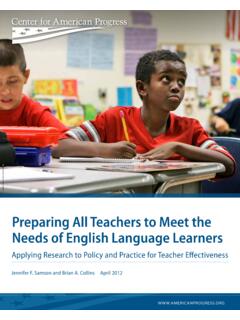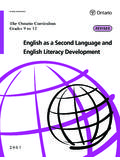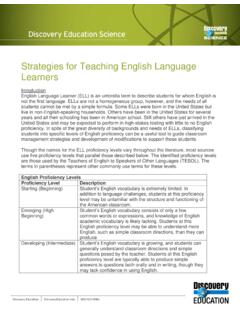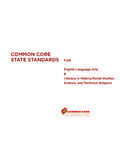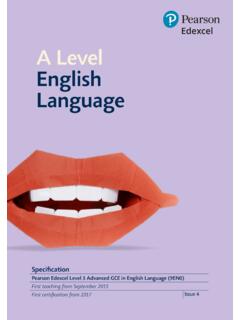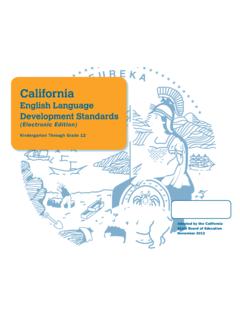Transcription of Literature and English Language Teaching and Learning: A …
1 English Language Teaching ; Vol. 7, No. 3; 2014 ISSN 1916-4742 E-ISSN 1916-4750 Published by Canadian Center of Science and Education 85 Literature and English Language Teaching and learning : A Symbiotic Relationship Richard C. Ihejirika1 1 Directorate of General Sutdies, Federal University of Technology, Owerri, Nigeria Correspondence: Richard C. Ihejirika, Directorate of General Sutdies, Federal University of Technology, Owerri, Nigeria. Tel: 80-3376-4807. E-mail: Received: November 4, 2013 Accepted: January 9, 2014 Online Published: February 12, 2014 URL: Abstract A close look at Literature and Language shows that the two are closely related. This close relationship is obvious because from all indications, Literature presupposes Language . It is inconceivable to discuss Literature without reference to Language .
2 But going by the traditional practice at the secondary school level in Nigerian context, there are indications that Literature and English Language are treated as two separate school subjects. At the senior secondary school level, the subjects are taught in different classroom settings by teachers that are either designated Literature teachers or English teachers. By this dichotomy, the Literature teachers, to a large extent, pre-occupy their Teaching period with the Teaching of the stories, the contents and the socio-cultural, economic and religious implications of the prescribed literary texts without placing much emphasis on the Language components of the texts. In the end, some students have been found to have done very well in the Literature exams but perform poorly in English Language .
3 Against this background, this paper posited that the relationship between Literature and Language is symbiotic. It was, therefore, suggested that the relationship should be explored and exploited in order to enhance effective Teaching and learning of Literature and English Language at the secondary school level so that the learners would possess high level of proficiency in the use of English Language , which would ultimately contribute immensely in addressing the seeming poor academic performance at the secondary and tertiary levels of education in Nigeria. Some suggestions for effective Teaching and learning of Literature and English Language were made. Keywords: Literature , English Language , Language Teaching and learning , symbiotic relationship 1. Introduction The significant role of English Language in the linguistic, educational, socio-economic and cultural settings of Nigeria is not in doubt.
4 In the field of education in particular, English Language plays a dominant role. As the Language for education and by extension the target Language , the success or failure of formal education, to a large extent, depends on the level of competence of learners in English Language in schools and colleges. Unfortunately, in contemporary time, available evidence in the way our students use English in our schools and colleges shows that their English Language competence and English Language awareness leave much to be desired (Onukaogu, 2002, p. 300). For instance, it is common knowledge that a good number of secondary school leavers and tertiary institution graduates hardly express themselves fluently in both spoken and written English , and this anomaly has been found to be partly responsible for the poor academic performance threatening all levels of education in Nigeria.
5 As to what is typically responsible for the poor performance in English Language among students, myriad of reasons have been advanced by scholars. For instance, Ubahakwe (1988) identifies a couple of factors which among other things include the educational setting, the educational system, teachers status and motivation, the examination pattern, the learning environment, teacher preparation and Language philosophy. Ayodele (1988) states that the causes of the abysmal performance in English Language must be traced to the classroom because the formal classroom practices provide by far the greatest avenue for the learning of the Language . Babatunde (2002, p. 130) identifies the classroom factors to include: teachers low level of competence in the Language skills, especially reading; unduly large classroom; too many periods per week; lack of incentive; and learners unserious attitude among others.
6 Another classroom factor threatening effective acquisition of English Language is the method of Teaching Literature which separates it from English Language . By this method, English Language Teaching Vol. 7, No. 3; 2014 86 Literature classroom is different from that of English Language . Consequently, the resources of Literature , which have the potentialities of enhancing effective Language learning , are denied the learners. This practice, no doubt, could be said to have inhibited effective Teaching and learning of Literature and English Language in our schools and colleges. No wonder a good number of Nigerian secondary school students hardly express themselves sufficiently in English even after they had offered Literature and had a good grade in it. In the light of the foregoing, the thrust of this paper is to establish the fact that there is a symbiotic relationship between Literature and Language ; and further demonstrate how Literature could be integrated with English Language Teaching and learning in an ESL setting for effective result.
7 2. The Concept and Functions of Literature The term Literature is used basically in two different senses. First, it is used to refer to any written material on a subject. Second, it is a term used to refer to one of the school subjects studied by students or a university discipline; and it is this second sense that applies to us in this context. As a subject or discipline, Literature has been variously defined by different scholars. According to Onuekwusi (2013, p. 5), Literature is any imaginative and beautiful creation in words whether oral or written, which explores man as he struggles to survive in his existential position and which provides entertainment, information, education and excitement to its audience . Although the definition of Literature by Onuekwusi succinctly attempts to capture the essence of Literature , it is pertinent to point out that not all Literature is imaginative.
8 As a matter of fact, some literary works are factual, and it is based on this understanding that the prose genre is classified into two, namely fiction and non-fiction. A good example of a popular non-fictional literary work is Zambia Shall be Free written by Kenneth Kaunda. But be that as it may, the basic element in Literature that is indispensable that can be deduced from the definition under reference is the fact that Literature , no matter the type or genre, is written in words. This is to say that Language is the basic raw material with which Literature is manufactured. It is based on this view that it is usually said that Literature is Language in practice . That is to say that Language theories, concepts and styles are put into function in the creation of literary texts.
9 Therefore, if one must interpret and analysis a literary text, one must be competent in the Language of the text and conversely if one must be competent in Language , one should be sufficiently exposed to the Literature of the Language in question. As a school subject, there are some significant functions Literature performs. Put differently, the whole essence of developing Literature as a school subject is for the students to derive some benefits. Ayo (2003, p. 128) describes the benefits as the general utilities of Literature . According to him, the utilities of Literature could be educational, cultural, moral, recreational and socio-political. Literature helps to develop the learner s linguistic performance because it arouses their zeal and keeps in them an ever-ready inclination to read.
10 Moreover, it helps the learners to develop fluency and the ability to comprehend what is read . Collie and Slater (1987) support the inclusion of Literature in the Language classroom because it provides valuable authentic material, develops personal involvement and help contribute to readers cultural as well as Language enrichment. Still on the utilities of Literature , Lazar (1993, pp. 15-19) provides five reasons for using Literature in ELT to include: 1) Motivating materials 2) Encouraging Language acquisition 3) Expanding students Language awareness 4) Developing students interpretative abilities 5) Educating the whole person. Adding his voice to the utilities of Literature as a school subject, Unoh (1981) quoted in Ogunnaike (2002) posits that a good Literature can be an important aid to cultural assimilation or acculturation; Language development and competence; conflict resolution; emotional development and stability; development of positive and good-oriented attitudes to life; a good liberal education, entertainment, relaxation and the sharing of vicarious experiences of positive value; the development of desired and desirable moral or other attributes; and as a consequence of all these, a stable and mature personality.










